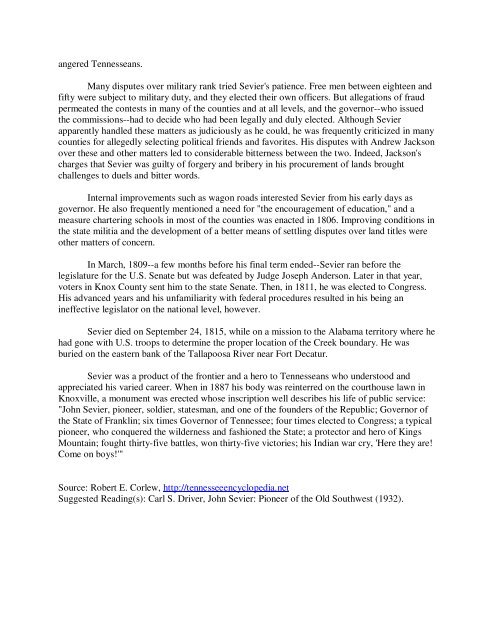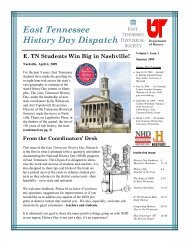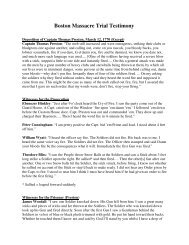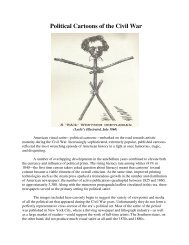John Sevier - Teach American History
John Sevier - Teach American History
John Sevier - Teach American History
You also want an ePaper? Increase the reach of your titles
YUMPU automatically turns print PDFs into web optimized ePapers that Google loves.
angered Tennesseans.<br />
Many disputes over military rank tried <strong>Sevier</strong>'s patience. Free men between eighteen and<br />
fifty were subject to military duty, and they elected their own officers. But allegations of fraud<br />
permeated the contests in many of the counties and at all levels, and the governor--who issued<br />
the commissions--had to decide who had been legally and duly elected. Although <strong>Sevier</strong><br />
apparently handled these matters as judiciously as he could, he was frequently criticized in many<br />
counties for allegedly selecting political friends and favorites. His disputes with Andrew Jackson<br />
over these and other matters led to considerable bitterness between the two. Indeed, Jackson's<br />
charges that <strong>Sevier</strong> was guilty of forgery and bribery in his procurement of lands brought<br />
challenges to duels and bitter words.<br />
Internal improvements such as wagon roads interested <strong>Sevier</strong> from his early days as<br />
governor. He also frequently mentioned a need for "the encouragement of education," and a<br />
measure chartering schools in most of the counties was enacted in 1806. Improving conditions in<br />
the state militia and the development of a better means of settling disputes over land titles were<br />
other matters of concern.<br />
In March, 1809--a few months before his final term ended--<strong>Sevier</strong> ran before the<br />
legislature for the U.S. Senate but was defeated by Judge Joseph Anderson. Later in that year,<br />
voters in Knox County sent him to the state Senate. Then, in 1811, he was elected to Congress.<br />
His advanced years and his unfamiliarity with federal procedures resulted in his being an<br />
ineffective legislator on the national level, however.<br />
<strong>Sevier</strong> died on September 24, 1815, while on a mission to the Alabama territory where he<br />
had gone with U.S. troops to determine the proper location of the Creek boundary. He was<br />
buried on the eastern bank of the Tallapoosa River near Fort Decatur.<br />
<strong>Sevier</strong> was a product of the frontier and a hero to Tennesseans who understood and<br />
appreciated his varied career. When in 1887 his body was reinterred on the courthouse lawn in<br />
Knoxville, a monument was erected whose inscription well describes his life of public service:<br />
"<strong>John</strong> <strong>Sevier</strong>, pioneer, soldier, statesman, and one of the founders of the Republic; Governor of<br />
the State of Franklin; six times Governor of Tennessee; four times elected to Congress; a typical<br />
pioneer, who conquered the wilderness and fashioned the State; a protector and hero of Kings<br />
Mountain; fought thirty-five battles, won thirty-five victories; his Indian war cry, 'Here they are!<br />
Come on boys!'"<br />
Source: Robert E. Corlew, http://tennesseeencyclopedia.net<br />
Suggested Reading(s): Carl S. Driver, <strong>John</strong> <strong>Sevier</strong>: Pioneer of the Old Southwest (1932).






